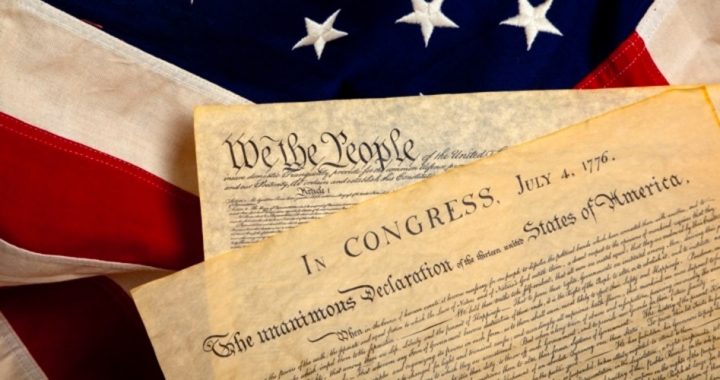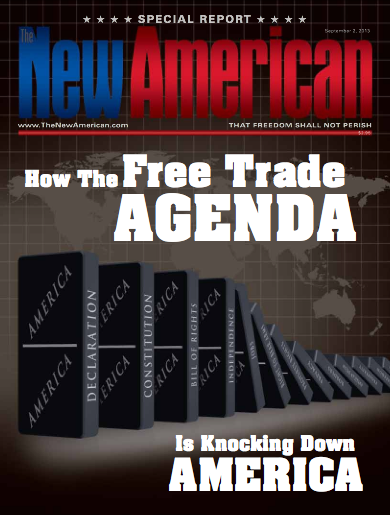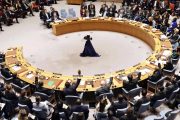
It was not so very long ago when a 33-year-old attorney spent much of his time during two seasonably hot weeks in his second-floor apartment in an Eastern city drafting an important document on a portable writing desk of his own design. Finally, a clean copy of his draft was submitted to an assembly of delegates, of which he was a member.
Next, he spent an excruciating two and a half days while this assembly, sitting as a committee of the whole, edited every line of his draft. Finally, on July 4, 1776, the Continental Congress approved what we now know as “The Declaration of Independence” by Thomas Jefferson.
Our most precious heritage as Americans is contained in the Declaration:
We hold these truths to be self-evident, that all men are created equal, that they are endowed by their Creator with certain unalienable Rights, that among these are Life, Liberty and the pursuit of Happiness. — That to secure these rights, Governments are instituted among Men, deriving their just powers from the consent of the governed.
Although the Articles of Confederation provided legitimacy for the new nation during the War for Independence, it took the Constitutional Convention of 1787 to provide a government that would adequately secure our rights. And it has for over 220 years.
Among other things, the above passage from the Declaration of Independence established our nation as unique in asserting that our rights come from God and that governments are instituted to secure these rights. Although we all remember the Declaration as listing our rights of life, liberty, and the pursuit of happiness, we don’t as easily remember that it says that these three rights are only “among” our other God-given rights. Many of these other rights were spelled out in the Bill of Rights, the first 10 amendments to the new Constitution that were proposed by Congress on March 4, 1789, and ratified by the states as of December 15, 1791.
Many of our rights are at the heart of the big news stories of the present day. For example, our right “to keep and bear arms” (Amendment II) is being threatened by the UN Arms Trade Treaty, gun control bills in Congress, and Obama administration initiatives in response to the Newtown school shooting and the Zimmerman verdict. Furthermore, our right “to be secure in [our] persons, houses, papers, and effects, against unreasonable searches and seizures” (Amendment IV) is being infringed by massive government surveillance of our personal phone calls, e-mails, and other online activities. And in a last example, our right not to be “deprived of … property, without due process of law” (Amendment V) is being violated by the implementation of the UN’s Agenda 21 by local, county, and state planning bodies.
So you’re probably thinking, yes, I know about our rights and how they are secured by our government, but what’s this got to do with the free trade agenda?
Fake Free Trade
In brief, the connection is that the rights that we prize as Americans are secured by the independent republic that was established by the Constitution in 1787 that we know as the United States of America. However, contrary to the meaning conjured up in our minds by the innocent-sounding term “free trade agreement,” such agreements generally create partnerships that affect many other areas beyond trade, set up supranational tribunals and governing bodies, and, in general, greatly diminish the independence of the parties to the agreement. To the extent that our nation loses its independence, to that same extent it loses its ability to secure our rights.
In this special issue of The New American we are not arguing against “free trade” policies that have led to lower tariffs and lower export subsidies over the past couple centuries. However, we are taking issue with what we are referring to as the “free trade agenda” that has emerged in recent decades and that has led to numerous so-called free trade agreements since the 1990s and the establishment of the World Trade Organization (WTO) in 1995.
The hundreds of free trade agreements between two or more nations since the 1990s are considered “regional trade agreements” by the WTO, and all of them are duly registered with the WTO as agreements under its jurisdiction. However, even the WTO does not claim to be consistently a proponent of free trade. For example, in the “Who We Are” page on its website (www.wto.org), the WTO states:
But the WTO is not just about opening markets, and in some circumstances its rules support maintaining trade barriers…. Trade relations often involve conflicting interests. Agreements, including those painstakingly negotiated in the WTO system, often need interpreting. The most harmonious way to settle these differences is through some neutral procedure based on an agreed legal foundation. That is the purpose behind the dispute settlement process written into the WTO agreements.
In short, the WTO considers itself to be a supranational last resort for settling trade disputes between nations.
Our congressmen were warned about the significance of placing the United States under the jurisdiction of the WTO by none other than Newt Gingrich during his testimony before the House Ways and Means Committee in June 1994:
I am just saying that we need to be honest about the fact that we are transferring from the United States at a practical level significant authority to a new organization. This is a transformational moment….
I agree … this is very close to Maastricht [the European Union treaty by which the EU member nations surrendered considerable sovereignty], and twenty years from now we will look back on this as a very important defining moment. This is not just another trade agreement. This is adopting something which twice, once in the 1940s and once in the 1950s, the U.S. Congress rejected. I am not even saying we should reject it; I, in fact, lean toward it. But I think we have to be very careful, because it is a very big transfer of power.
Later that year, prospective Speaker of the House Newt Gingrich helped bring about a lame-duck session of Congress following the 1994 November elections. It was during that session when America’s entry into the WTO was approved by the House and Senate. Gingrich voted “yea.”
In contrast to our current situation where our nation has made “a very big transfer of power” to the WTO regarding trade matters, Article I, Section 8, of the U.S. Constitution states: “The Congress shall have Power … to regulate Commerce with foreign Nations.”
That is to say, our Constitution gives Congress the exclusive power of regulating our nation’s trade with foreign nations. This is an essential component of our national independence. Eventually, we need to restore our Constitution and national independence by withdrawing from the WTO and all of its regional trade agreements, such as the North American Free Trade Agreement (NAFTA), the Central American Free Trade Agreement (CAFTA), and so on.
Furthermore, in 1974, Congress surrendered to the executive branch a great deal of its exclusive power of regulating foreign trade by granting the president fast-track negotiating authority (see our article “Fast Track: Enabler of the ‘Free Trade’ Agenda”). This fast-track authority remained in effect until 1994. It was restored in 2002 under the name Trade Promotion Authority (TPA), but expired again in 2007. Fast-track authority severely compromises the role of Congress in regulating foreign trade by transferring the initiative for negotiating “free trade” agreements to the executive branch, and then when a completed trade agreement is ready for congressional approval, it only permits Congress an up-or-down vote on the agreement with no amendments or filibusters permitted.
Although the Obama administration does not currently have TPA, it formally requested this authority earlier this year. Since TPA is so useful for expediting trade agreements through Congress, you can expect TPA legislation to be introduced and voted on in Congress prior to any votes on approving new free trade agreements.
By approving our nation’s membership in the WTO and approving the numerous “free trade” agreements that have followed, Congress has seriously undermined our national independence by unilaterally surrendering its constitutional power to regulate foreign trade to supranational tribunals and organizations.
Our nation has already experienced incremental losses of independence through its participation in the North American Free Trade Agreement. Not only has the economic integration stemming from the NAFTA agreement included NAFTA tribunals that are superior to the U.S. Supreme Court in cases involving North American trade, but furthermore, NAFTA has provided a platform for initial steps in the political integration of the United States with Mexico and Canada, which is commonly referred to as building the North American Union (NAU; see our article “North American Union: From NAFTA to the NAU”).
Present Path
To the extent that new multilateral trade pacts are capable of putting our nation on a path leading to the end of our national independence and changing our form of government, these new trade pacts could end our government’s ability to secure our God-given rights. In other words, the life of freedom that we have enjoyed as Americans, with our rights secured by our independent, constitutional republic, is at risk from the free trade agenda of the Obama administration.
The Obama administration is currently negotiating two mammoth free trade deals: the Trans-Pacific Partnership (TPP; see “Regional Scheme for the Pacific Rim”) and the Transatlantic Trade and Investment Partnership (TTIP; see “EU/U.S. — Transatlantic Convergence”). The TPP involves a free trade agreement between the United States and 11 Pacific Rim nations, including Japan; a vote on congressional approval is expected as early as late 2013. The TTIP involves a free trade agreement between the United States and the European Union (EU); a vote by Congress could occur by 2015.
To understand the very real danger of losing our national independence and therefore our rights, it is instructive to compare our situation now with that of Europe in the 1950s. See our article “The EU: Regionalization Trumps Sovereignty” to learn how the sovereign nations of Europe in 1951 have been transformed into the European Union of 2013. As this article points out, the EU began in 1951 with what seemed to be a very limited degree of cooperation among six European nations regarding their coal and steel industries, the European Coal and Steel Community (ECSC). By 1957, European insiders had parlayed the ECSC into the European Economic Community (EEC, or Common Market). Now fast forward to the present day. The EU now comprises 28 formerly independent European nations. These 28 member states are virtually completely under the control of the European Commission, the European Parliament, the European Central Bank, and the Court of Justice of the European Union. And, as the article points out, the European Union is on a course to further strengthen its control over its 28 member states.
Six years ago the United States signed a “trans-Atlantic economic integration plan” with the EU. Then this year on February 12, President Obama mentioned in his State of the Union address that his administration intended to complete negotiations on the Trans-Pacific Partnership and to launch talks on a comprehensive Transatlantic Trade and Investment Partnership with the European Union. Sure enough, on July 8 representatives from the United States and EU met in Washington, D.C., for one week to begin negotiations on the TTIP with the goal of economic integration of the United States and EU. This is the same EU that aggressively politically integrated its 28 member states into a new EU superstate after it had economically integrated them.
Although the United States is still considered the most powerful nation in the world, do we seriously expect that we won’t end up being politically integrated with the EU if we proceed with the TTIP? We should especially expect this outcome when we realize that it is our establishment elites who have funded and guided the formation of the EU ever since World War II. Now they are positioned to finish off the job and create a powerful new regional government bloc from the present-day United States and EU. If they are allowed to complete this step, then the next step would be integrating the U.S.-EU bloc with other regional government blocs as a next step toward an eventual world government under the United Nations (see our article “Global Merger Piece by Piece”).
Jeffrey J. Schott, senior fellow, Peterson Institute for International Economics, has already alluded to this next step of further integration of the existing and proposed new trade blocs in an interview, “Why Transatlantic Trade Winds Are Blowing,” posted on the Council on Foreign Relations website on February 25, 2013:
There will be a great effort and incentive [to take these super-regional arrangements, such as TPP and TTIP, and the precedents that they are setting and] to say, “Let’s try to seek some convergence on these broad rule-making initiatives, by bringing the agreements together in Geneva [WTO headquarters] and trying to multilateralize regionalism.” We may be reaching a time when we can begin to operationalize the concept of multilateralizing regionalism.
Schott is saying that we are reaching a time when the internationalist elites can move from the stage of multilateral negotiation of trade agreements between nations to the next stage of multilateral negotiation of super-sized trade agreements between trade blocs.
The UN-appointed Commission on Global Governance had already anticipated this next stage in its 1995 report, Our Global Neighborhood, where it stated:
The UN must gear itself for a time when regionalism becomes more ascendant worldwide and assist the process in advance of that time. Regional co-operation and integration should be seen as an important and integral part of a balanced system of global governance.
Thus, this UN report is saying that the time is fast approaching when regional economic and political blocs could be stitched together into a “balanced system of global governance” under the United Nations, in other words a UN world government.
The bottom line is that we absolutely could not trust a UN world government to secure our God-given rights. According to the UN’s Universal Declaration of Human Rights (1948), Article 8, a person’s rights are “granted him by the constitution or by law.” Implicit in that statement is the important fact that a government that grants rights — through a constitution or through some law — is a government that can cancel them. Furthermore, Article 29 says:
In the exercise of his rights and freedoms, everyone shall be subject only to such limitations as are determined by law…. These rights and freedoms may in no case be exercised contrary to the purposes and principles of the United Nations.
So, the UN spells out that our rights are subject to limitations as are determined by law and that our rights can never be exercised contrary to the purposes and principles of the UN.
What a far cry from our American heritage of freedom in the Declaration:
We hold these truths to be self-evident, that all men are created equal, that they are endowed by their Creator with certain unalienable Rights, that among these are Life, Liberty and the pursuit of Happiness. — That to secure these rights, Governments are instituted among Men, deriving their just powers from the consent of the governed.
Our American heritage is one of God-given rights, secured by an independent, constitutional republic. We must not surrender to a deceptive free trade agenda that would destroy the national independence of the government that has secured our rights for over 220 years.
 The above article is the “Overview” article in our special report “How the Free Trade Agenda Is Knocking Down America” (click here for the PDF). Please read the entire report to learn the details of the deceptive and dangerous free trade agenda so that you can better convince others that Congress must not approve either the Trans-Pacific Partnership or the Transatlantic Trade and Investment Partnership agreements, if we intend to remain free and independent.
The above article is the “Overview” article in our special report “How the Free Trade Agenda Is Knocking Down America” (click here for the PDF). Please read the entire report to learn the details of the deceptive and dangerous free trade agenda so that you can better convince others that Congress must not approve either the Trans-Pacific Partnership or the Transatlantic Trade and Investment Partnership agreements, if we intend to remain free and independent.




Nothing is “free” because it always comes at the expense of something else. An example is the big push for sending all our manufacturing to China (not just from America but from Europe too) at the SAME time. While America was struggling find it’s place in the global economy as a “service” Country, The China Development Bank had the likes of Dr. Henry A. Kissinger, former State Secretary of the United States Mr. Ramond Barre, former Premier and thte Mayor of Paris, Mr. Paul Volcker, former Chairman of U.S. Federal Reserve. on the International Advisory Council in March 1999. “The council’s objective is to provide valuable insights to STRENGTHEN the Bank’s management, as well as broaden Communication between CDB and the INTERNATIONAL FINANCIAL community….they discussed in 2001: 1.the global trend of financial markets and financing methods, 2.means of financing the economic growth of individual countries,3.challenges that WTO has brought to China’s financial market and 4. the relationship between markets, government and development financial institutions.”
Does this sound like Sovereign countries with the best interest of a sovereign country at the heart of the matter or does it sound like the Pooling of Sovereignty as a model for the global ruling?
If America and Europe are hurting because of the debt crisis and China holds the debts..then they didn’t do it alone but with the help of “friendly” advisors from several countries looking to line their own pockets at the expense of their native country with “free trade” as their WMD as the weapon of choice. This is only ONE example.